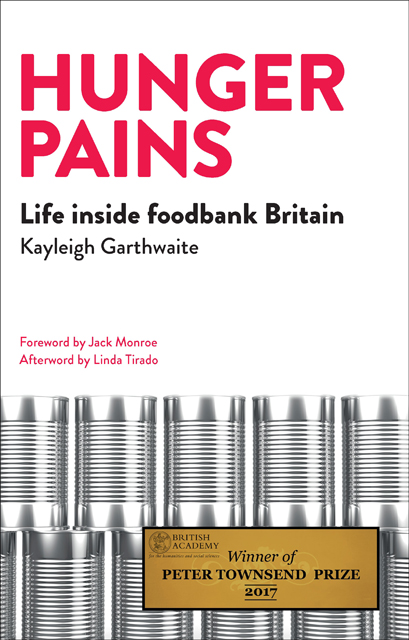Book contents
- Frontmatter
- Dedication
- Contents
- List of figures and boxes
- Acknowledgements
- Foreword by Jack Monroe
- Introduction
- one Researching foodbank use
- two Foodbanks: what do they do?
- three The politics of foodbank use in the UK
- four Why do people use a foodbank?
- five All work, low pay: finding, keeping and doing precarious jobs
- six “Doing the best I can with what I’ve got”: food and health on a low income
- seven Stigma, shame and “people like us”
- Conclusion: is foodbank Britain here to stay?
- Afterword by Linda Tirado
- Notes
- Bibliography
- Index
seven - Stigma, shame and “people like us”
Published online by Cambridge University Press: 15 April 2023
- Frontmatter
- Dedication
- Contents
- List of figures and boxes
- Acknowledgements
- Foreword by Jack Monroe
- Introduction
- one Researching foodbank use
- two Foodbanks: what do they do?
- three The politics of foodbank use in the UK
- four Why do people use a foodbank?
- five All work, low pay: finding, keeping and doing precarious jobs
- six “Doing the best I can with what I’ve got”: food and health on a low income
- seven Stigma, shame and “people like us”
- Conclusion: is foodbank Britain here to stay?
- Afterword by Linda Tirado
- Notes
- Bibliography
- Index
Summary
The most difficult part of being a volunteer was sitting opposite someone who felt embarrassed at walking through the doors of the foodbank. Every week, I watched people come in, pulling their red vouchers out of their pocket, fidgeting with humiliation, avoiding eye contact as much as possible. Their embarrassment was inescapable. I always started off by introducing myself, taking people to a table and sitting down with them, asking if they wanted a cup of tea or coffee. Sometimes people didn’t want to chat, but if they did, one of us would be there. I remember my very first time entering the foodbank. Maureen thought I was there to get food and asked me if I had a voucher. I felt flustered, a bit embarrassed that she thought that was why I was there. I can’t imagine how hard it must be if you are really there asking for a food parcel.
Stigma has a long history, with debates around the ‘deserving’ and ‘undeserving’ poor, as we saw in Chapter Three. American sociologist Erving Goffman defined stigma as:
The phenomenon whereby an individual with an attribute which is deeply discredited by his/her society is rejected as a result of the attribute. Stigma is a process by which the reaction of others spoils normal identity.
Stigma, Goffman argued, arises during social interaction, when the social identity of an individual is found to be ‘spoiled’ by attributes that mark that person as deviant from the group norm and as being incapable of fulfilling the role requirements of that or other social interactions. In the case of foodbank use, the act of obtaining a red voucher and asking for a food parcel could be a highly stigmatising experience. Academics at Manchester University found that while the food parcel from a foodbank may be seen as ‘free’, there are hidden ‘costs’ of social stigma and shame. Pat Caplan explains how many people using a foodbank can ‘see themselves as failures, excluded from normal society, and often claim to be ashamed that they cannot provide for their families’. Ben Baumberg and colleagues identified three different levels of stigma for benefits recipients: personal, social and institutional. People using the foodbank were experiencing personal, social and institutional stigma, but foodbanks are rapidly becoming part of everyday life.
- Type
- Chapter
- Information
- Hunger PainsLife inside Foodbank Britain, pp. 135 - 148Publisher: Bristol University PressPrint publication year: 2016



